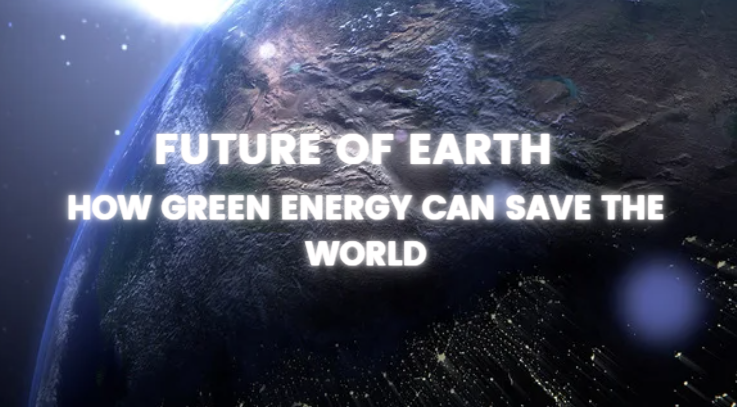The future of earth is hanging in the balance. Experts believe we need to decarbonize the global economy to reverse the adverse effects of fossil fuel energy use.
Wildfires, floods, climate change, global warming, drought and other extreme weather events are affecting the future of earth and have all been linked to the production and use of fossil fuel.
According to recent reports, fossil fuel accounts for 82 percent of our total global energy consumption. The same report reveals that carbon dioxide emissions from energy use, industrial processes, flaring and methane grew to a new high of 39.3 GtCO2 e, with emissions from energy use rising 0.9% to 34.4 GtCO2 e.
The dilemma is how to strike this balance and still produce enough energy and food for the ever-growing world population.
The future of our planet depends on our ability to transition from fossil fuels to more sustainable sources of energy. Green energy, often referred to as renewable energy, offers a promising solution to mitigate the environmental challenges posed by climate change and resource depletion.
In this article, we will explore the significant ways in which green energy can affect the Earth’s future.
Mitigating Climate Change
One of the most pressing global challenges we face is climate change, primarily driven by the emission of greenhouse gases, such as carbon dioxide, from burning fossil fuels.
Green energy sources, such as solar, wind, hydro, and geothermal power, produce little to no direct greenhouse gas emissions during energy generation.
By replacing fossil fuels with these clean alternatives, we can significantly reduce our carbon footprint and slow down the rate of global warming.
Reducing Air Pollution
Besides emitting carbon dioxide, the combustion of fossil fuels releases harmful air pollutants like sulfur dioxide, nitrogen oxides, and particulate matter.
These pollutants contribute to smog formation, respiratory diseases, and other health problems. Green energy technologies produce electricity without such emissions, leading to cleaner air and improved public health.
Natural Resources Conservation
Fossil fuels are finite resources, and their extraction is often environmentally destructive. Green energy, on the other hand, relies on sources like sunlight, wind, and water, which are virtually inexhaustible.
By harnessing these abundant resources, we can reduce our dependence on finite fossil fuels, mitigating the environmental damage associated with their extraction and transportation.
Protecting Ecosystems
The development and operation of fossil fuel infrastructure often lead to habitat destruction, soil contamination, and disruption of ecosystems.
Green energy projects, when designed and managed responsibly, have a smaller ecological footprint.
For instance, solar farms can coexist with agriculture, and wind turbines can be sited in a way that minimizes impact on wildlife. These practices help protect biodiversity and preserve natural ecosystems.
Enhancing Energy Security
Reliance on fossil fuels has long made nations vulnerable to supply disruptions and price fluctuations. Green energy, on the other hand, offers a decentralized and diversified energy landscape.
By investing in local renewable energy sources, countries can enhance their energy security, reduce vulnerability to geopolitical tensions, and ensure a stable energy supply.
Job Creation and Economic Growth
The transition to green energy is not only an environmental imperative but also an economic opportunity.
The renewable energy sector has seen rapid growth in recent years, leading to the creation of millions of jobs worldwide.
This growth spans various industries, including manufacturing, installation, maintenance, and research and development.
Furthermore, green energy investments can stimulate local economies and reduce long-term energy costs for businesses and consumers.
Fostering Technological Innovation
The pursuit of green energy solutions has driven significant advancements in technology and innovation.
Research and development in solar cells, wind turbines, energy storage, and grid management have accelerated, leading to more efficient and cost-effective green energy systems.
These innovations have the potential to benefit other sectors beyond energy, spurring broader technological progress.
Encouraging Sustainable Lifestyles
The transition to green energy goes hand in hand with a broader shift toward sustainability. As individuals and communities embrace renewable energy sources, they often become more conscious of their energy consumption and environmental impact.
This increased awareness can lead to the adoption of energy-efficient technologies and sustainable lifestyles, further reducing our collective environmental footprint.
Finally, on the Future Of Earth
Green energy represents a pivotal solution to the environmental challenges facing our planet.
By transitioning away from fossil fuels and embracing renewable energy sources, we can mitigate climate change, improve air quality, conserve natural resources, protect ecosystems, enhance energy security, create jobs, foster innovation, and encourage sustainable living.
The future of the Earth depends on our commitment to embracing and expanding the use of green energy technologies to build a more sustainable and resilient world for generations to come.

Comments (2)